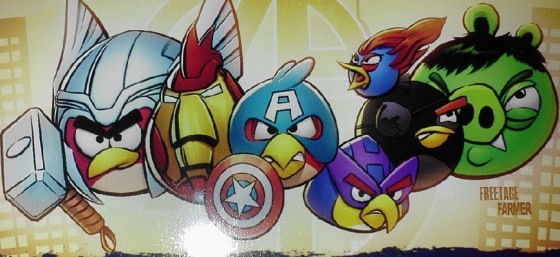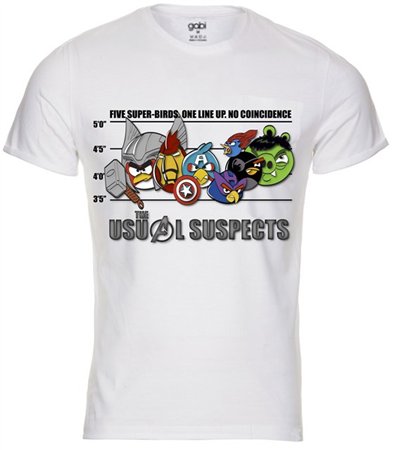
I recently wrote a post about copyright, fair use, and fan fiction and I did an analysis of Marty Freetage’s artwork that was on the badges for Phoenix Comicon this year. It was an awesome parody of Angry Birds and The Avengers. Parodies are generally permissible under the fair use doctrine and I thought Marty’s work was original enough that the copyright holders for Angry Birds and The Avengers probably wouldn’t come after him or Phoenix Comicon for copyright infringement.

This week I was surprised to see a t-shirt for sale on Gabilife that looks exactly like Marty’s picture. A lot of people on Facebook posted that Gabilife used Marty’s work, changed the background, and stuck it on a shirt. Whoever owns the copyright in the badge art has good reason for believing that their Gabilife is infringing on their work.
This story gets more complicated by Gabilife claims to be a company in India. It raises the question of what are the possible recourse options to make them stop selling the shirt. If they have a presence in the United States, whoever owns the copyright could go after Gabilife for infringement as if they were a US-based company.
Gabilife’s terms state “Pursuant to Title 17, United States Code, Section 512(c)(2), notifications of claimed copyright infringement under United States copyright law should be sent to Service Provider’s Designated Agent.” I searched the agent list on the US Copyright website and I didn’t see a listing for Gabilife or Gabi. That makes me wonder if they just copied someone else’s terms and conditions without registering an agent.
If owned the copyright for the original badge art, I’d register the copyright in the artwork immediately. A copyright holder maximizes their options for recourse if they register their copyright within 3 months of publication or 1 month of learning of the infringement, whichever happens first. If this art hasn’t been registered, that window could still be open.
If the work was registered in time, I’d sue them for copyright infringement if it was a US company. If the company doesn’t do business in the US, there’s probably no point to suing them. If suing them would be pointless, I’d either send a DMCA takedown notice to the email address listed on their site and to their snail mail address. If I wanted to be really bold, I would send them a licensing agreement and a bill that states that they agreed to the licensing agreement by using the artwork without permission.
I wouldn’t expect them to pay me, but it would be validating.
So what is the take away message?
- Register your copyrights shortly after creating an original work, especially when you’re as awesome as Marty.
- If you suspect someone is ripping off your work, contact a copyright attorney in your community (like me!) to help you strategize and execute your response.
Feel free to connect with me via Twitter, Google+, Facebook, and LinkedIn.
Please visit my homepage for more information about Carter Law Firm.
